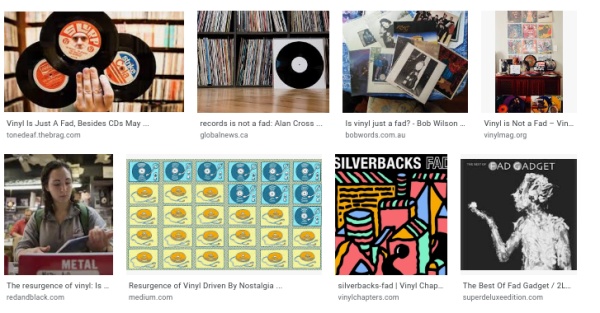The Hidden Cost of Streaming Music: is it really IN music?
Me, I am not sure.
“Decomposed: The Political Ecology of Music,” is a book about the “material history of recorded music, counting the impact of music from the 78 to digital streaming”. A New Yorker review explains that:
- the point of the book is that there is no such thing as a nonmaterial way of listening to music
- “The environmental cost of music is now greater than at any time during recorded music’s previous eras.”
The reason is obvious, and is that the “digital” world is anything but immaterial. When it comes to music, according to the book, in 2016, “streaming and downloading music generated around a hundred and ninety-four million kilograms of greenhouse-gas emissions - some forty million more than the emissions associated with all music formats in 2000."

Image search results for Vinyl is a Fad
</em></u>
Further data from the book about the environmental footprint of each music format are available here. More information about “music-induced” pollution is here for streaming, and here for non-digital formats.
In addition to this huge environmental footprint, online listening has other hidden or overlooked costs, starting from exploitation of workes, from Foxconn factories in China to child labor in african cobalt mines. Quoting again from the New Yorker:
“Spotify, the dominant streaming service, needs huge quantities of energy to power its servers. No less problematic are the streaming services' own exploitative practices, including their notoriously stingy royalty payments to working musicians."
Let’s get a few things straight
I do not know the details of all those calculations. But I am pretty sure that a pretty big part of the pure hardware part of all those environmental and human costs would still exist, all other things being equal, if music did not exist.
Without music, that is, there would still be almost the same amount of data centers, fiber optics, cellphone towers and smartphones than today. From that side, digital music has the advantages of:
- using “capacity” (storage, lines etc) that exists or would have existed anyway, and that can be, in any moment, instantaneously “repurposed” for other needs
- not creating other, surely small but additional uses of fossil fuels, like selling nostalgia in an LP form factor
- being “democratic”, by being the only way to appreciate much music, for people who cannot afford the space to keep analog copies of the same amount quantity of music hours they can “carry” in their pockets.
As far as the human costs are concerned, a very similar reasoning applies. The exploitation of harware or music workers, children in mines, users and artists, etc.. would still exist, all other things being equal, if music were still analog.
To fix those problems, that are very little, if anything, specific to music, it is necessary to change copyright, labour and other laws. Then, it is necessary to change personal habits, because the material pollution from our smartphones comes from changing them every two years instead of twenty, regardless of if and how much music they stream.
Spotify? Huh?
The biggest problem with Spotify, and any other company with the same business model, is the one that would remain even if Spotify treated musicians and employees in the best possible way. It is that Spotify wants to be Soma.
So, what is the right way to enjoy music?
In not so random order:
- if you can, compose and play it
- listen to live music whenever possible
- download songs to a local hard drive, and listen to it locally, changing the hardwar only when it physically falls apart. It’s awkward, but is probably the least worst way there is today to deal with this problem
Who writes this, why, and how to help
I am Marco Fioretti, tech writer and aspiring polymath doing human-digital research and popularization.
I do it because YOUR civil rights and the quality of YOUR life depend every year more on how software is used AROUND you.
To this end, I have already shared more than a million words on this blog, without any paywall or user tracking, and am sharing the next million through a newsletter, also without any paywall.
The more direct support I get, the more I can continue to inform for free parents, teachers, decision makers, and everybody else who should know more stuff like this. You can support me with paid subscriptions to my newsletter, donations via PayPal (mfioretti@nexaima.net) or LiberaPay, or in any of the other ways listed here.THANKS for your support!